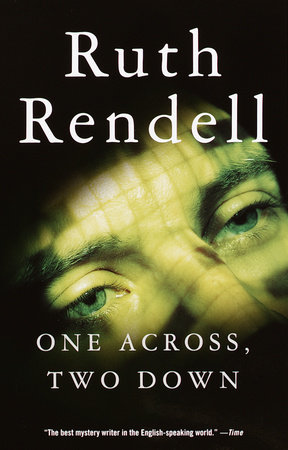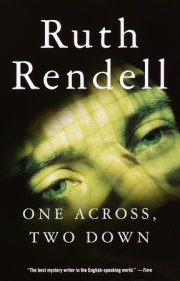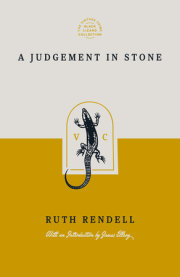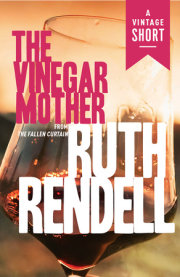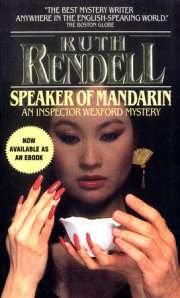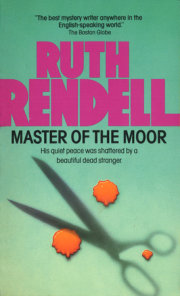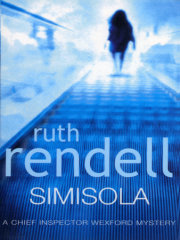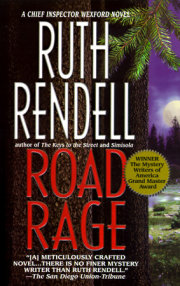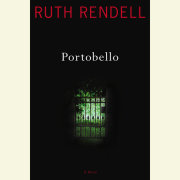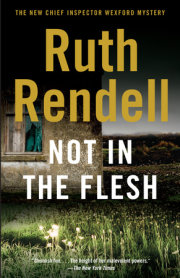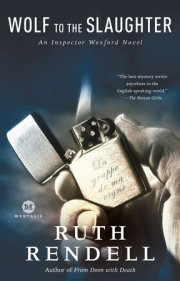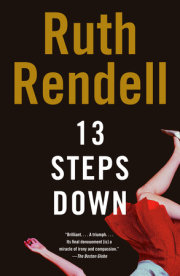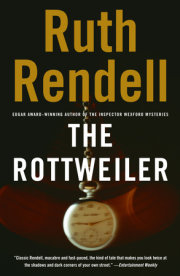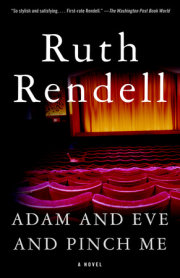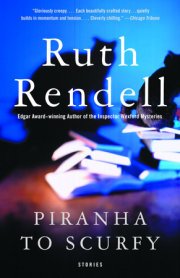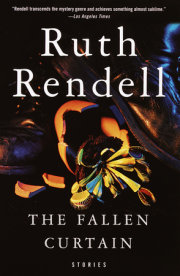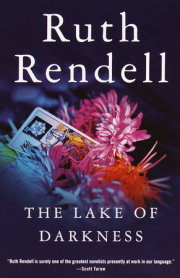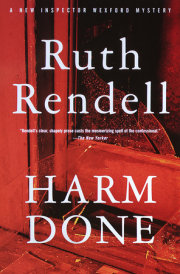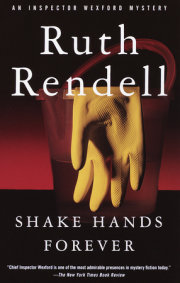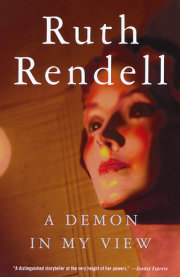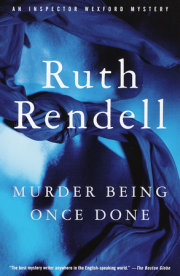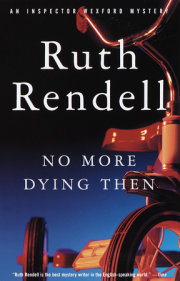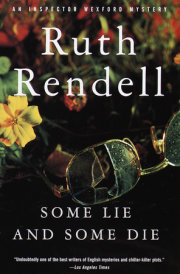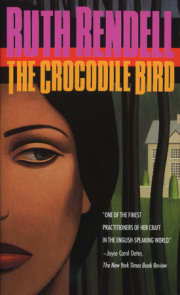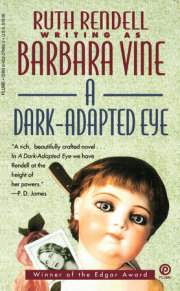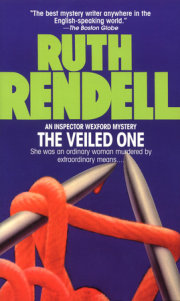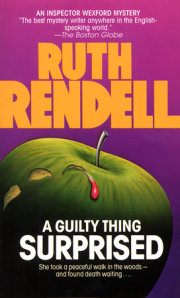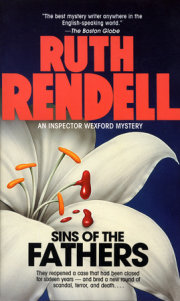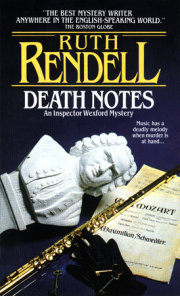Blank Puzzle
1
Vera Manning was very tired. She was too tired even to answer her mother back when Maud told her to hurry up with getting the tea.
"There's no need to sulk," said Maud.
"I'm not sulking, Mother. I'm tired."
"Of course you are. That goes without saying. Anyone can see you're worn out with that job of yours. Now if Stanley had the gumption to get himself a good position and brought a decent wage home you wouldn't have to work. I never heard of such a thing, a woman of your age, coming up to the change, on her feet all day in a dry-cleaner's. I've said it before and I'll say it again, if Stanley was a man at all . . ."
"All right Mother," said Vera. "Let's give it a rest, shall we?"
But Maud, who scarcely ever stopped talking when there was anyone to listen to her and who talked to herself when she was alone, got out of her chair and, taking her stick, limped after Vera into the kitchen. Perching herself with some difficulty-she was a large heavily-built woman-on a stool, she surveyed the room with a distaste which was partly sincere and partly assumed for her daughter's benefit. It was clean but shabby, unchanged since the days when people expected to see a ganglion of water pipes protruding all over the walls and a dresser and built-in plaster copper requisite fitments. Presently, when the scornful glance had set the scene for fresh propaganda, Maud drew a deep breath and began again.
"I've scraped and saved all my life just so that there'd be something for you when I'm gone. D'you know what Ethel Carpenter said to me? Maud, she said, why don't you give it to Vee while she's young enough to enjoy it?"
Her back to Maud, Vera was cutting meat pie in slices and shelling hard-boiled eggs. "It's a funny thing, Mother," she said, "the way I'm an old woman one minute and a young one the next, whichever happens to suit your book."
Maud ignored this. "Why don't you give it to Vee now, she said. Oh no, I said. Oh no, it wouldn't be giving it to her, I said, it'd be giving it to that no-good husband of hers. If he got his hands on my money, I said, he'd never do another hand's turn as long as he lived."
"Move over a bit, would you, Mother? I can't get at the kettle."
Shifting an inch or two, Maud patted her thick grey curls with a lady's idle white hand. "No," she said, "while I've got breath in my body my savings are staying where they are, invested in good stock. That way maybe Stanley'll come to his senses. When you have a nervous breakdown, and that's the way you're heading, my girl, maybe he'll pull his socks up and get a job fit for a man, not a teenager. That's the way I see it and that's what I said to Ethel in my last letter."
"Would you like to sit up now, Mother? It's ready."
Vera helped her mother into a chair at the dining room table and hooked her stick over the back of it. Maud tucked a napkin into the neckline of her blue silk dress and helped herself to a plateful of pork pie, eggs, green salad and mashed potato. Before starting on it, she swallowed two white tablets and washed them down with strong sweet tea. Then she lifted her knife and fork with a sigh of sensual pleasure. Maud enjoyed her food. The only time she was silent was when she was eating or asleep. As she was starting on her second piece of pie, the back door slammed and her son-in-law came in.
Stanley Manning nodded to his wife and gave a sort of grunt. His mother-in-law, who had temporarily stopped eating to fix him with a cold condemning eye, he ignored. The first thing he did after throwing his coat over the back of a chair was to turn on the television.
"Had a good day?" said Vera.
"Been up to my eyes in it since nine this morning." Stanley sat down, facing the television, and waited for Vera to pour him a cup of tea. "I'm whacked out, I can tell you. It's no joke being out in the open all day long in weather like this. To tell you the truth, I don't know how long I can keep on with it."
Maud sniffed. "Ethel Carpenter didn't believe me when I told her what you did for a living, if you can call it a living. A petrol pump attendant! She said that's what her landlady's son does in his holidays from college. Eighteen he is, just a student doing it for pin money."
"Ethel Carpenter can keep her nose out of my business, the old bag."
"Don't you use language like that about my friend!"
"Oh, pack it up, do," said Vera. I thought you were going to watch the film."
If Stanley and Maud were in accord over one thing it was their fondness for old films and now, having exchanged venomous glances, they settled down among the tea things to watch Jeanette MacDonald in The Girl of the Golden West. Vera, a little revived with two hot cups of tea, sighed thankfully and began clearing the table. Altercation would break out again, she knew, at eight o'clock when Stanley's favourite quiz programme conflicted with Maud's favourite serial. She dreaded Tuesday and Thursday evenings. Of course it was only natural that Stanley, with his passion for puzzles, should want to watch the quizzes that took place on those nights, and natural too that Maud, in common with five million other middle-aged and elderly women, should long for the next development in the complicated lives of the residents of "Augusta Alley." But why couldn't they come to an amicable arrangement like reasonable people? Because they weren't reasonable people, she thought, as she began the washing up. For her part, she couldn't care less about the television and sometimes she hoped the cathode ray tube would break or a valve go or something. Certainly the way things were, they wouldn't be able to afford to get it seen to.
Jeanette MacDonald was singing "Ave Maria" when she got back into the living room and Maud was accompanying her in a sentimental cracked soprano. Vera prayed for the song to end before Stanley did something violent like bringing Maud's stick down on the table with a thunderous crash, as he had done only the week before. But this time he contented himself with low mutterings and Vera leant her head against a cushion and closed her eyes.
Four years Mother's been here, she thought, four long years of unbroken hell. Why had she been so stupid and so impulsive as to agree to it in the first place? It wasn't as if Maud was ill or even really disabled. She'd made a marvellous recovery from that stroke. There was nothing wrong with her but for a weakness in the left leg and a little quirk to her mouth. She was as capable of looking after herself as any woman of seventy-four. But it was no good harking back now. The thing was done, Maud's house sold and all her furniture, and she and Stanley had got her till the day she died.
Maud's petulant angry wail started her out of her half-doze and made her sit up with a jerk.
"What are you turning over to I.T.V. for? I've been looking forward to my 'Augusta Alley' all day. We don't want that kids' stuff, a lot of schoolkids answering silly questions."
"Who pays the licence, I'd like to know?" said Stanley.
"I pay my share. Every week I turn my pension over to Vee. Ten shillings is the most I ever keep for my bits and pieces."
Stanley made no reply. He moved his chair closer to the set and got out pencil and paper.
"All day long I was looking forward to my serial," said Maud.
"Never mind, Mother," said Vera, trying to infuse a little cheerfulness into her tired voice. "Why don't you watch 'Oak Valley Farm' in the afternoons when we're at work? That's a nice serial, all about country people."
"I have my sleep in the afternoons, that's why not. I'm not upsetting my routine."
Maud lapsed into a moody silence, but if she wasn't to be allowed to watch her programme she had no intention of allowing Stanley uninterrupted enjoyment of his. After about five minutes, during which Stanley scribbled excitedly on his pad, she began tapping her stick rhythmically against the fender. It sounded as if she was trying to work out the timing of a hymn tune. "Dear Lord and Father of Mankind," Vera thought it was, and presently Maud confirmed this by humming the melody very softly.
Stanley stood it for about thirty seconds and then he said, "Shut up, will you?"
Maud gave a lugubrious sigh. "They played that hymn at your grandfather's funeral, Vera."
"I don't care if they played it at Queen Victoria's bloody wedding," said Stanley. "We don't want to hear it now, so do as I say and shut up. There, now you've made me miss the score."
"I'm sure I'm very sorry," said Maud with heavy sarcasm. "I know you don't want me here, Stanley, you've made that very plain. You'd do anything to get rid of me, wouldn't you? Grease the stairs or give me an overdose?"
"Maybe I would at that. There's many a true word spoken in jest."
"You hear what he says, Vera? You heard him say it."
"He doesn't mean it, Mother."
"Just because I'm old and helpless and sometimes I hark back to the old days when I was happy."
Stanley leapt to his feet and the pencil bounced on to the floor.
"Will you shut up or do I have to make you?"
"Don't you raise your voice to me, Stanley Manning!" Maud, satisfied that she had ruined Stanley's quiz, rose and, turning to Vera with great dignity, said in the voice of one mortally wounded, "I shall go to bed now, Vera, and leave you and your husband in peace. Perhaps it wouldn't be expecting too much if I was to ask you to make me my Horlick's and bring it up when I'm in bed?"
"Of course I will, Mother. I always do."
"There's no need to say 'always' like that. I'd rather go without than have it done in a grudging spirit."
Maud wandered round the room, picking up her knitting from one chair, her glasses from another, her book from the sideboard. She could have got all these things by walking behind Stanley, but she didn't. She walked between him and the television set.
"Mustn't forget my glass of water," she said, and added as if she was boasting of some highly laudable principle, as salutary to the body as it was demanding of strength of character. "I've slept with a glass of water beside my bed ever since I was a little mite. Never missed once. I couldn't sleep without my glass of water."
She fetched it herself, leaving a little trail of drips from the overfull glass behind her. They heard her stick tapping against the treads as she mounted the stairs.
Stanley switched off the television and, without a word to his wife, opened the Second Bumper Book of Advanced Crosswords. Like an overworked animal, worn out with repetitive tedious labour, her mind empty of everything but the desire for sleep, Vera stared at him in silence. Then she went into the kitchen, made the Horlick's and carried it upstairs.
Sixty-one, Lanchester Road, Croughton, in the northern suburbs of London, was a two-storied red brick house, at the end of a terrace, and built in 1906. There was a large back garden, and between the living room bay and the front fence a strip of grass five feet by fifteen.
The hall was a passage with a mosaic floor of red and white tiles, and downstairs there were two living rooms and a tiny kitchen, as well as an outside lavatory and a cupboard for coal. The stairs ran straight up without a bend to a landing from which opened four doors, one to the bathroom and three to the bedrooms. The smallest of these was big enough to accommodate only a single bed, dressing table and curtained-off area for clothes. Vera called it the spare room.
She and Stanley shared the large double bedroom at the front of the house and Maud slept in the back. She was sitting up in bed, the picture of health in her hand-knitted angora bedjacket. But for the thirty or so metal curlers clipped into her hair, she might well have entered for and won a glamorous grandmother contest.
Perhaps the bottles and jars of patent and prescribed medicaments on the bedside table had something to do with the preservation, indeed the rejuvenation, of her mother, Vera thought, as she handed Maud the mug of Horlick's. There were enough of them. Anti-coagulants, diuretics, tranquillizers, sleep inducers and vitamin concentrates.
"Thank you, dear. My electric blanket won't come on. It needs servicing."
Turning away from her draggled and exhausted reflection in Maud's dressing table mirror, Vera said she would see to it tomorrow.
"That's right, and while you do you can ask them to look at my radio. And get me another ounce of this pink wool, will you?" Maud sipped her Horlick's. "Sit down, Vee. I want to talk to you where he can't hear."
"Can't it wait till tomorrow, Mother?"
"No, it can't. Tomorrow might be too late. Did you hear what he said to me about doing me in if he had the chance?"
"Oh Mother, you don't really think he meant it?"
Maud said calmly, "Stanley hates me. Not that it isn't mutual. Now you listen to what I've got to say."
Vera knew what was coming. She heard it with slight variations once or twice a week. "I'm not leaving Stan, and that's that. I've told you over and over again. I'm not leaving him."
Maud finished her Horlick's and said in a cajoling tone, "Just think what a life we could have together, Vee, you and me. I've got money enough for both of us. I'm telling you in confidence, I'm a wealthy woman by anyone's standards. You wouldn't have to go to work, you wouldn't have to lift a finger. We'd have a nice new house. I saw in the paper they're building some lovely bungalows out Chigwell way. I could buy one of them bungalows outright."
"If you want to give me some of your money, Mother, you can give it to me. I shan't argue. God knows, there's plenty we need in this house."
"Stanley Manning isn't getting a penny of my money," said Maud. She took her teeth out and placed them in a glass; then she gave Vera a gummy wheedling smile. "You're all I've got, Vee. What's mine is yours, you know that. You don't want to share it with him. What's he ever done for you? He's a crook and a jailbird."
Vera controlled herself with difficulty.
"Stanley has been to prison once and once only, Mother, as you very well know. And that was when he was eighteen. It's downright cruel calling him a jailbird."
"He may have been to prison just the once, but how many times would he have been back there if all those people he works for hadn't been soft as butter? You know as well as I do he's been sacked twice for helping himself out of the till."
Getting to her feet, Vera said, "I'm tired, Mother, I want to go to bed and I'm not staying here if all you can do is abuse my husband."
"Ah, Vee . . ." Maud put out a hand and managed to make her wrist quiver as she did so. "Vee, don't be cross with me. I had such high hopes for you and look at you now, a poor old drudge tied to a man who doesn't care whether you live or die. It's true, Vee, you know it is." Vera let her hand rest limply in her mother's and Maud squeezed it tenderly. "We could have a lovely house, dear. Wed have fitted carpets and central heating and a woman in to clean every day. You're still young. You could learn to drive and I'd buy you a car. We could go for holidays. We could go abroad if you like."
"I married Stanley," said Vera, "and you always taught me marriage is for keeps."
"Vee, I've never told you how much I've got. If I tell you, you won't tell Stanley, will you?" Vera didn't say anything, and Maud, though seventy-four and for many years married herself, hadn't yet learnt that it is no good telling secrets to a married person if you want them to remain secrets. For, no matter how shaky the marriage and how incompatible the partners, a wife will always confide other people's confessions in her husband and a husband in his wife. "My money's mounted up through the years. I've got twenty thousand pounds in the bank, Vera. What d'you think of that?"
Vera felt the colour drain out of her face. It was a shock. Never in her wildest dreams had she supposed her mother to have half that amount, and she was sure it had never occurred to Stanley either.
"It's a lot of money," she said quietly.
"Now don't you tell him. If he knew what I was worth he'd start thinking up ways to get rid of me."
"Please, Mother, don't start that all over again. If anyone heard you they'd think you were going daft in the head. They would."
"Well, they can't hear me. I'll say good night now, dear. We'll talk about it again tomorrow."
"Good night, Mother," said Vera.
She didn't think any more about what her mother had said on the lines of taking her away from Stanley. She had heard it all before. Nor was she very much concerned that Maud suspected Stanley of murderous inclinations. Her mother was old and the old get strange ideas into their heads. It was silly and fantastic but it wasn't worth worrying about.
But she did wonder what Stanley would say when-and that would have to be when she was less tired-she told him how much money Maud had in the bank. Twenty thousand! It was a fortune. Still thinking about it, and thinking how even one-twentieth part of it would improve the house and make her lot so much lighter, Vera stripped off her clothes and rolled exhausted into bed.
2
Maud was an old woman with dangerously high blood pressure and one cerebral thrombosis behind her, but she wasn't affected in her mind. The ideas she had that her son-in-law might kill her if he got the chance weren't the fruit of senile maunderings but notions of human behaviour formed by Maud in her impressionable teens.
She had gone into service at the age of fourteen and much of the talk in the kitchen and the servants' hall had dealt with unscrupulous persons whom her fellow servants suspected of murder or the intention of murder for gain. Cook often insisted that the valet in the big house across the square would poison his master as soon as the time was ripe merely for the sake of the hundred pounds promised to him in the old man's will, while the butler countered this with horrible tales of greedy heirs in the great families that had employed him. Maud listened to all this with the same receptive ear and the same gullibility as she listened to the vicar's sermons on Sundays.
It seemed that from the butler down to the tweeny, no servant was without a relative who at some time or another had not considered popping arsenic in a rich aunt's tea. A favourite phrase in the servants' hall, on the lines of Eliza Doolittle's statement, was:
"It's my belief the old man done her in."
And it was Maud's sincere belief that Stanley Manning would do her in if he got the chance. Enlightening Vera as to the extent of her fortune had been a temptation she hadn't been able to resist, but when she awoke on the following morning she wondered if she had been unwise. Vera would very likely tell Stanley and there was nothing she, Maud, could do about it.
Nothing, that is, to silence Vera. Much could perhaps be done to show Stanley that, though he might kill her, he wouldn't profit from his iniquities. With these things uppermost in her mind, Maud ate the breakfast Vera brought to her in bed and when her daughter and son-in-law had left for work, got up, dressed and left the house. With the aid of her stick she walked the half-mile to the bus stop and went down into town to consult a solicitor whose name she had found in Stanley's trade directory. She could easily have bought her own wool and seen to the servicing of her electric blanket at the same time and saved Vera's feet, but she didn't see why she should put herself out for Vera when the silly girl was being so obstinate.
Back in the house by twelve Maud ate heartily of the cold ham, salad, bread and butter and apple crumble pie Vera had left her for her lunch and then she settled down to write her weekly letter to her best friend, Ethel Carpenter. Like most of the letters she had written to Ethel since she came to live in Lanchester Road, it dealt largely with the idleness, ill manners, bad temper and general uselessness of Stanley Manning.
There was no one, Maud thought, whom she could trust like she could trust Ethel. Even Vera, blindly devoted to that good-for-nothing, couldn't be relied on like Ethel who had no husband, no children and no axe to grind. Poor Ethel had only her landlady, owner of the house in Brixton where she occupied one room, and Maud herself.
Ah, you valued a friend when you'd been through what she and Ethel had been through together, thought Maud as she laid down her pen. How long ago was it they'd first met? Fifty-four years? Fifty-five? No, it was just fifty-four. She was twenty and the under housemaid and Ethel, little, innocent seventeen-year-old Ethel, the kitchen maid at that sharp-tongued cook's beck and call.
Maud was walking out with George Kinaway, the chauffeur, and they were going to get married as soon as their ship came in. She had always been a saver, had Maud, and whether the ship came in or not they'd have enough to get married on by the time she was thirty. Meanwhile there were those delicious quiet walks with George on Clapham Common on Sundays and the little garnet engagement ring she wore round her neck on a bit of ribbon, for it wouldn't have done at all to have it on her finger when she did out the grates.
She had George and something to look forward to but Ethel had nothing. No one knew Ethel even had a follower of her own or had ever spoken to a man, bar George and the butler, until her trouble came on her and Madam turned her out of the house in disgrace. Ethel's aunt took her in and everyone treated her like dirt except Maud and George. They weren't above going to see her at the aunt's house on their evenings off, and when the child came it was George who persuaded the aunt to bring it up and George who contributed a few shillings every week to its maintenance.
"Though we can ill afford it," said Maud. "Now if she'd only stop being a little fool and tell me who the father is . . ."
"She'll never do that," said George. "She's too proud."
"Well, they do say that pride goeth before a fall and Ethel's taken her fall all right. It's our duty to stick by her. We must never lose touch with Ethel, dear."
"If you say so, dear," said George, and he got Madam to take Ethel back just as if she were a good girl without a stain on her character.
Those were hard days, Maud thought, leaning back her head and closing her eyes. Twelve pounds a year she got until the Great War came and made people buck up their ideas. Even when the master raised her wages it was hard going to get a home together and in the end it was George's good looks and nice manners that gave them their start. Not that there had ever been anything wrong between him and Madam-the very idea!-but when she died George was in her will, and with the two hundred and fifty he got and what Maud had saved they'd bought a nice little business down by the Oval.
Ethel always came to them for her holidays and when Vera was born Ethel was her godmother. It was the least she could do for Ethel, Maud confided in George, seeing that she'd been deprived of her own daughter and wasn't likely ever to get a husband of her own, second-hand goods as she was.
What with George's charm and Maud's hard work the shop prospered and soon they could think themselves comfortably off. Vera was sent to a very select private school and when she left at the late (almost unheard-of) age of sixteen, Maud wouldn't let her get a job or serve in the shop. Her daughter was going to be a lady and in time she'd marry a nice gentlemanly man, a bank clerk or someone in business-Maud never told people her husband kept a shop. She always said he was "in business"-and have a house of her own. Meanwhile she gave Vera all the money she wanted within reason for clothes and once a year they all went down to Brayminster-on-Sea-dear old Bray, as they called it-and stayed at a very genteel boarding-house with a view of the sea. Sometimes Ethel went with them and she was just as pleased as they when her goddaughter found favour in the sight of the boarding-house keeper's nephew, James Horton.
James had the very job Maud envisaged as most desirable in a son-in-law. He worked in the Brayminster branch of Barclay's Bank, and when during the winter months he occasionally came up to London and took Vera on the river or to the theatre matin?e, Maud smiled on him and began discussing with George what they could do for the young couple when they fixed the day. A deposit on a house and two hundred for furniture was Ethel Carpenter's recommendation and Maud thought this not unreasonable.
Four years older than Vera, James had been a petty officer in the Royal Navy during the war. He had a nice little sum on deposit at the bank, was a dutiful son and churchgoer. Nothing could be more suitable.
Maud had old-fashioned ideas and thought young people should only be allowed to know each other if they had been properly introduced or if their parents were old friends. It was with horror, therefore, that she learned from Mrs. Campbell, the wife of the fishmonger down the road, that Vera had been seen about in the company of the young barman at the Coach and Horses whom, Mrs. Campbell alleged, she had met at a dance.
It was all George's fault, Maud told Ethel. If she had had her way, Vera would never have been allowed to go to that dance. She had tried to put her foot down but for once George had asserted himself and said there was no harm in Vera going with a girl friend and what could be more respectable than the Young Conservatives' annual ball?
"I'm sure I don't know what James will say when he hears about it," Maud said to Vera.
"I don't care what he says. I'm sick of James, he's so boring. Always on about going to bed early and getting up early and saving money and keeping oneself to oneself. Stanley says you're only young once and you might as well enjoy yourself. He says money's there to spend."
"I daresay he does when it's someone else's. A barman! My daughter sneaking out with a barman!" Although she sometimes permitted George to enjoy a quiet pint in the Bunch of Grapes with Mr. Campbell on Friday nights, Maud had never in her life set foot in a public house. "Anyway, it's got to stop, Vee. You can tell him your mother and father won't allow it."
"I'm twenty-two," said Vera, who, though her father's daughter in looks and generally in temperament, had inherited a spark of her mother's spirit. "You can't stop me. You're always on about me getting married but how can I get married when I never meet any men? Girls can't meet men when they don't go out to work."
"You met James," said Maud.
Afterwards she wasn't sure which was the worst moment of her life, the time when Mrs. Campbell told her Stanley Manning had served two years for robbery with violence or the time when Vera said she was in love with Stanley and wanted to marry him.
Copyright © 2001 by Ruth Rendell. All rights reserved. No part of this excerpt may be reproduced or reprinted without permission in writing from the publisher.

